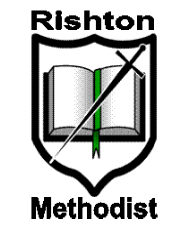Online Safety
E - Safety and Acceptable Use of the Internet.
E-safety
As computer and other communications technologies have developed, new dangers have emerged for all those who use them.
Schools have a duty of care towards their pupils, above all to enable them to use the internet and other communication technologies safely
The steps we take at Rishton Methodist Primary School are that:
- we keep abreast of the latest developments, for instance having key staff attending regular update training, and give appropriate advice to parents and children.
- we have an appropriate Acceptable Internet Use Policy in place, linked to other school policies
- the Acceptable Internet Use Policy is regularly reviewed in a whole school context
- our high-speed broadband connection is to the lancsngfl, a Lancashire wide organisation which provides secure e-mail and web filtering facilities.
- staff are kept informed of new developments in technology.
- pupils are regularly reminded of the rules regarding internet use, sanctions are explained and used consistently when necessary.
- children are taught to use the web safely
- children are not allowed use of mobile phones in school
- children are not allowed to access chat rooms, message boards, messenger services or other 'social networking' websites in school
- children are only allowed access to subscription websites under direct teacher supervision
Other aspects of e-safety
Apart from the obvious threats to personal safety the internet involves other difficulties and dangers which the school also seeks to address through lessons on: copyright, acknowledgement of sources, assessing the usefulness of websites, assessing the reliability of information on the internet, the importance of cross-checking, verification and comparison of information, the dangers of viruses and other downloadable threats, the importance of responsible use of passwords etc.
On-line safety at home
At home, sometimes children can be given unsupervised access to the Internet. This, potentially, allows them to access all kinds of material (both good and bad) and bring them virtually into their homes.
Here are some tips and useful links to help you to keep your children safe online:
- Keep your computer in a shared area - Talk to your child about what they are doing online and, if possible, set up your computer or mobile device in a shared area at home so that you can all share in the wonderful sites that are available online.
- Have open discussions with your children about what they have been doing online.
- Monitor their use to ensure they are accessing their devices safely.
Some links to more information:
- Think U Know - containing internet safety advice for those aged from 5 to 16, along with parents and teachers, this site is produced by CEOP (the Child Exploitation and Online Protection Centre).
- Kidsmart - An award-winning internet safety programme for children.
- Know IT All - lots of useful advice for keeping yourselves and your children safe on the Internet.
- Bullying UK - Information and advice about bullying for children, parents and schools.
- Kidscape - An organisation which helps to prevent bullying and child abuse.
- Childline - ChildLine is the free helpline for children and young people in the UK.
Reporting Online Abuse
If you are upset or worried about something that has happened to you or your child on the internet you can report any issues to CEOP.
Useful Websites for your Safety
Whether you are worried, scared or upset about anything at all, there is someone out there to help you. Below is our list of organisations to help you and your safety, no matter what your problem is.Click on the links to open the webpage in a new window.
Vodafone Digital Parenting
Click on this link - http://www.vodafone.com/content/parents.html to go to this very useful resource for all parents. Vodafone update this information three times a year and it is recommended by the LCC Safeguarding Team.
You can talk to ChildLine online or by phone whenever you need to. Whatever your worry, its better out than in.
(CEOP)If you or a friend are worried about something that's happened to you online or you're uncomfortable with something that another person on the internet is asking you to do, then don't keep it to yourself - you can report it here.
This site advises you to take 4 steps:
- Have ongoing conversations with your children about staying safe online
- Use safety tools on social networks and other online services
- Decide if you want to use parental controls on your home internet
- Understand devices and parental control tools they offer in the Parents Guide to Technology
(BeatBullying)For anyone aged 5-11 years old.Learn and practice how to be good friends and to look after yourself and others and stay safe online.
For anyone aged 3-11 years old. Learn about your Internet safety on adventures with Smartie the Penguin, or Captain Kara and the SMART Crew.
For anyone aged 5-10 years old. Learn with Clicky through games and videos about how to make yourself safe online.
For anyone aged 8-12 years old. Find out how to best protect yourself online through videos, games and the real life experiences from people your age.
Updated September 2023
